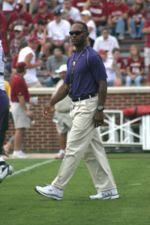
Ok, lets talk. I was never a football player in either high school or college. Also, I never started liking football until my mid-twenties. The NFL, to me is easy to analyze, you suck and you get fired. I can understand that. There are some very smart business people that own NFL teams (Even if you hate their guts). Heres the problem, I am a University of Washington fan. Yes, I said it UW Huskies. I didn't graduate from there (although my dad and a bunch of my friends did), but I just inherited a love for the team.
So here is my issue, Tyrone Willingham is the current coach of the UW football team. Even though he has had mediocre success with the three seasons he has coached so far, he has brought a sense of class and discipline that the UW football team has been lacking in the years prior. This season is a make or break season for his job, many pundits say that if Tyrone Willingham does not get a winning season he will not be retained. College football is one of those "semi-businesses" out there. College Presidents feel the pressure to make money with their big ticket sports to pay for a myriad of other extra-curricular activities that the university provides. However, Tyrone Willingham has been set up for failure ever since he took over the team. He was hired for the position with a brand new Athletic Director after many scandals had plagued the UW athletic system:
http://seattletimes.nwsource.com/html/victoryandruins/
The above article gives some highlights that are a bit more than bad grades and college tomfoolery (ie rape and domestic violence to name a few). What we had was a culture that was completely anti-social in it's nature.
So the question is: "How long does it take to change a criminal culture into a healthy one?" I think those in business would say quite a bit. Merely creating a culture of respect and discipline in an organization when it has sunk that low is quite difficult.
I find it amazing that since Willingham has taken over the team he has completely changed the attitude and reputation of the team while still attracting big name talent.
So in the case of this college football environment, is a results only metric for measuring Willingham's success fair? Four years in any other culture, business or otherwise, is a short time in which to work. The mere fact that rape and abuse allegations have stopped under Willingham's tenure should certainly count for something. The Athletic Director that hired Willingham was also recently fired. Was Willingham ever given the tools he would need to truly succeed amidst scandal, fines, and leader turnover.
Leaders need to be judged according to realistic goals and expectations. The above story shows that while results and business success certainly matter, long term strategy is also important. When one is facing extreme cultural barriers to success and change, success is the least of their worries and creating a functional organization takes precedence. When the support structure is ripped away from that leader it makes the task almost impossible.
Class is worth something I would hope that supposedly non-profit institutes of higher education would realize that.
So here is my issue, Tyrone Willingham is the current coach of the UW football team. Even though he has had mediocre success with the three seasons he has coached so far, he has brought a sense of class and discipline that the UW football team has been lacking in the years prior. This season is a make or break season for his job, many pundits say that if Tyrone Willingham does not get a winning season he will not be retained. College football is one of those "semi-businesses" out there. College Presidents feel the pressure to make money with their big ticket sports to pay for a myriad of other extra-curricular activities that the university provides. However, Tyrone Willingham has been set up for failure ever since he took over the team. He was hired for the position with a brand new Athletic Director after many scandals had plagued the UW athletic system:
http://seattletimes.nwsource.com/html/victoryandruins/
The above article gives some highlights that are a bit more than bad grades and college tomfoolery (ie rape and domestic violence to name a few). What we had was a culture that was completely anti-social in it's nature.
So the question is: "How long does it take to change a criminal culture into a healthy one?" I think those in business would say quite a bit. Merely creating a culture of respect and discipline in an organization when it has sunk that low is quite difficult.
I find it amazing that since Willingham has taken over the team he has completely changed the attitude and reputation of the team while still attracting big name talent.
So in the case of this college football environment, is a results only metric for measuring Willingham's success fair? Four years in any other culture, business or otherwise, is a short time in which to work. The mere fact that rape and abuse allegations have stopped under Willingham's tenure should certainly count for something. The Athletic Director that hired Willingham was also recently fired. Was Willingham ever given the tools he would need to truly succeed amidst scandal, fines, and leader turnover.
Leaders need to be judged according to realistic goals and expectations. The above story shows that while results and business success certainly matter, long term strategy is also important. When one is facing extreme cultural barriers to success and change, success is the least of their worries and creating a functional organization takes precedence. When the support structure is ripped away from that leader it makes the task almost impossible.
Class is worth something I would hope that supposedly non-profit institutes of higher education would realize that.
No comments:
Post a Comment